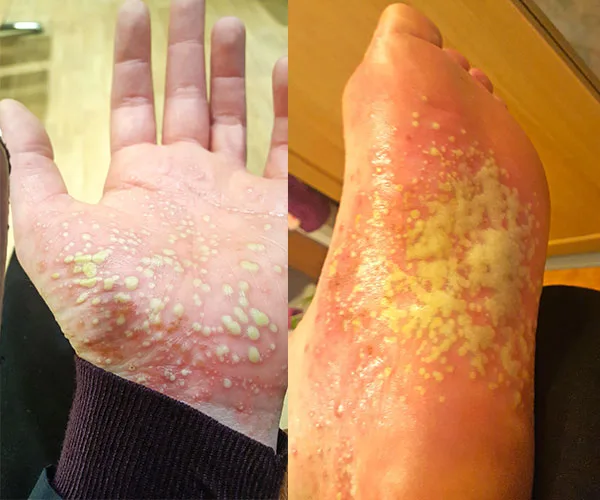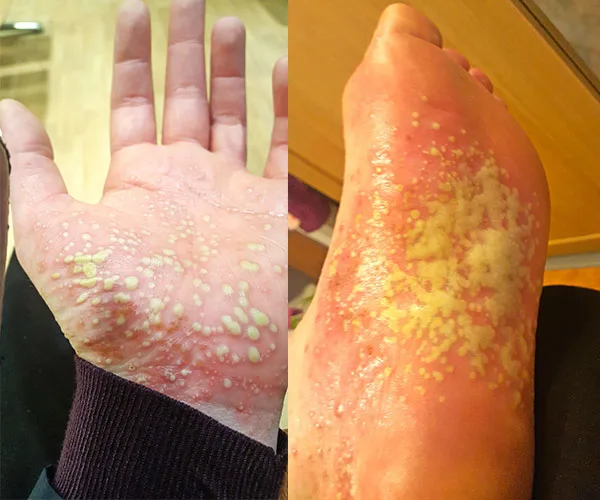Katie McKee, 37, shares her story with Take 5:
Sitting at work, I stared down at my hands on the keyboard.
Gross, I thought.
Overnight, a red, blotchy rash had appeared on the palms of my hands and I couldn’t stop scratching it.
At lunchtime, I dashed to the chemist, but the pharmacist was baffled.
I bought some cream to soothe the rash and went back to work.
That night, my temperature shot up and my skin felt like it was on fire, so next day, I went to the GP.
But she wasn’t sure what it was either and sent me home with antibiotics.
By now, the rash was covered in pus-filled welts and it was on my feet too.
The pain was unbearable. My left hand and foot were much worse than my right and walking anywhere was becoming impossible.
As I lay on the sofa at my mum’s, unable to move, I wept.

Me now.
(Image: Supplied)“Enough is enough,” Mum said. “You need to go to the walk-in centre.”
“OK,” I agreed.
My left sole was too painful for me to wear a shoe, so I inched my foot into a slipper and with Mum’s help, I hobbled to the car.
At the walk-in centre, I sobbed as I shuffled across the car park.
Thankfully a security guard saw me struggling and offered me a wheelchair.
Once inside, I was talking to the receptionist when a nurse spotted my hands.
“You need to go straight to hospital,” she said.
There, a doctor took one look at me and said: “You’ve got generalised pustular psoriasis.”
“What’s that?” I asked.

My feet and hands covered in blisters.
(Image: Supplied)I’d suffered with psoriasis before, but nothing like this.
“It’s a rare skin disease that can be triggered by an infection,” he explained.
I thought back to the previous weekend when I’d woken up with an extremely sore throat. After a few days it had disappeared but now I realised just how much damage the infection had done.
The doctor explained that the disease went in a cycle.
First, the skin turned red before the pustules formed. They then became scaly as they fell off.
And it was dangerous.
“If it’s not treated, it could spread to your organs,” he warned.
I was given antibiotics and morphine to ease the pain and booked in for an appointment with a dermatologist the following morning.
She said it was one of the worst cases she’d ever seen.
“We need to admit you to hospital right away,” she said.

“We need to admit you to hospital right away.”
(Image: Getty)Over the next few days, I was given antibiotics to treat the infection and lotions to calm the rash down.
I was also given medication to suppress my immune system to stop my body from overreacting to the infection.
Eventually, the pustules began to turn brown and flake off. Although the rash was horrifying to look at, I tried my best to make light of the situation.
After five days in hospital, I went home to recover.
My skin continued to shed and the smell was gut-wrenching. But after a few weeks, the rash had all but disappeared.
I still have to take medication to keep the psoriasis at bay but I’m just thankful there’s no permanent damage.
Now I want other people to know the symptoms.
If I hadn’t been treated when I was, who knows what could have happened.


